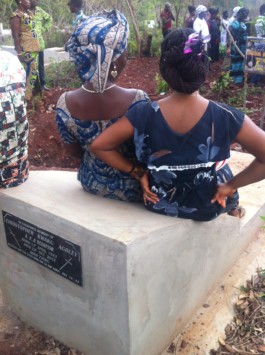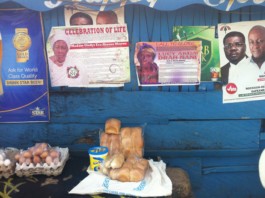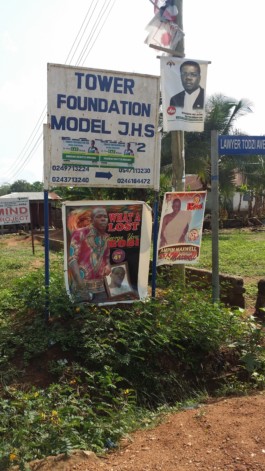My PhD in anthropology investigates the role of material substances, places, bodies and things for the social production of death in a Ghanaian town community.
I have carried out ethnographic fieldwork in Peki, Ghana (Volta Region) on three instances for a total of 8 months, between 2016 and 2019.



In Peki, an Ewe town in the Ghanaian Volta Region, death is a matter of public concern. By means of obituary banners, loudspeaker announcements, public lyings in state and a large number of different cemeteries, the dead and dead bodies occupy a prominent place in the world of the living. The book shows how communal practices in relation to death and the investment of tendential moral and temporal qualities in the material environment help to produce a ‘good’ kind of death, in which the dead can be spatially and temporally owned by the living. As such, materiality and death are productive of a political economy structured around the dead.
A variety of different actors and authorities, such as state representatives, local representatives of traditional forms of governance, kin groups and individuals compete over ownership of the dead in light of their respective aims. The work for the dead and the economy of labour around death connects the worlds of the dead and the living and may position community members in a position of debt towards both – a mechanism that fuels this exchange and that ensures the investment of social and monetary capital in the community, mediated in the funerary cycle.
Containing the dead means successfully integrating them into the body politic, in which the time and space of the dead are under the control of the living. In cases of bad death, different sequences and rituals are needed to achieve containment, although these kinds of dead retain ties to the world of the living and may therefore subvert attempts to own and contain them. The thesis uses Robert Hertz’s model of secondary burial and Alfred Gell’s method of time-mapping from his Anthropology of Time alongside approaches from material culture studies by Tim Ingold, Adam Drazin and Susanne Küchler, among others.
My research was funded in the framework of the DFG research training group 'Value and Equivalence' at Goethe University, Frankfurt am Main.
Papers presented at:
- 16th EASA Biannual Conference, EASA2020: New anthropological horizons in and beyond Europe. 21-24 July in Lisbon (Digital Edition)
- Australian Anthropological Society Conference
Canberra, 5. Dezember 2019 - The Freilich Project for the Study of Bigotry, Australian National University, Canberra, 3. Dezember 2019: “Now I am Dead” – Anthropological Encounters with the Other. Screening & Talk
- Finnish Biannual Anthropological Society Conference, official short film program, Now I am Dead – Screening & Q&A, Helsinki, August 2019
- Frobenius Institut, Sommersymposium, Now I am Dead – Screening & Q&A, Frankfurt, Juni 2019
- Museum Giersch, Tote Leben länger - Einblick in die Forschung und das Filmprojekt 'Now I am Dead' über den Umgang mit dem Tod in einer Stadt in Ghana. Screening & Talk. Frankurt, Februrary 2019
- Afrika Colloqium, Goethe Universität Frankfurt am Main, Februar 2019
- Leiden University, 'Fake and Real in Ancient and Modern Societies: Objects, Places, Practices. Leiden, April 2018
- ISCH 2017 Annual Conference, Umea University, Host: Panel ‘Subverting the Norm. Emotional Transgression in Visual Communication’, Paper: What a shock - Visual norms, 'the good death' and transgression in Ghanaian obituary posters. Umea, Sweden, June 2017.
- Institute for African Studies, University of Legon. Fieldwork Presentation. Accra, Ghana, May 2016.